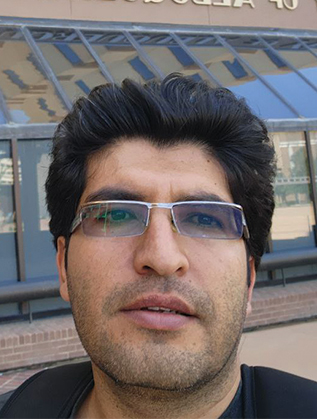NEWS
2023 NM SMART Grid Students Share Their Externship Experiences
NM EPSCoR works to support the next generation of STEM professionals in New Mexico. In the current award, the NM SMART Grid Center, we are pairing project students with New Mexico organizations through our Externship program.
In the summer and fall of 2023, two students participated in the Externship program. Jacqueline Chavez worked with Eastern New Mexico University (ENMU) on research employing machine learning to protect smart grids from cyber attacks, while Mohammad Ahmadi completed an Externship with the City of Albuquerque working on their Balanced Resource Acquisition and Information Network (BRAIN) project.
Check out the brief reports on their respective Externship experiences.
 Jacqueline Chavez (Undergraduate student, Eastern New Mexico University)
Jacqueline Chavez (Undergraduate student, Eastern New Mexico University)
The "Protecting Smart Grids with Machine Learning" research project was conducted during the Fall 2023 semester at ENMU. The project was undertaken by Jacqueline Chavez, an accomplished computer science student from El Paso, Texas, in collaboration with her mentor, Dr. Edgar Eduardo Ceh-Varela, an Assistant Professor of Computer Science at ENMU. Dr. Ceh-Varela, originally from Yucatan, Mexico, holds a Ph.D. in Computer Science from New Mexico State University (NMSU) and actively engages in multiple research projects with his students as part of the EMMA lab.
Jacqueline's research focuses on cyber-attack detection, a facet often categorized as anomaly detection due to its emphasis on identifying oddities from normal system behavior. The principal objective of this research was to investigate the impact of dimensionality reduction on the prediction accuracy of anomaly detection models, a critical consideration for enhancing smart grid security.
The implications of this research extend beyond anomaly detection. The insights garnered refine the understanding of feature extraction methods, offering valuable strategies for enhancing the effectiveness and efficiency of anomaly detection algorithms applied to smart grids. These results contribute to the academic knowledge in the field and present practical applications for more efficient smart grid security solutions. Read Jacqueline's full report here...
Jacqueline's externship experience was featured in an ENMU news story in September 2023:
 Mohammad Ahmadi (PhD student, UNM Mathematics and Statistics Department)
Mohammad Ahmadi (PhD student, UNM Mathematics and Statistics Department)
During my spring externship, I worked with Mr. Saif Ismail, Energy, and Sustainability Division Manager and his great team at the City of Albuquerque. We worked on the ongoing BRAIN project which creates a data repository and computer-based analytics platform that enables real-time interaction with the City’s current and historical utility and building performance-related data streams. We studied a comprehensive literature search in the most popular scientific databases about the use of AI-big data analytics for Building Energy Management Systems (BEMS). A BEMS is an advanced method to screen and control the building's energy needs. In addition to energy management, the system can be used to monitor and control many other building functions, regardless of whether it is a residential or commercial space. BEMS is a substantial topic currently due to its importance in reducing energy waste. BEMS can bridge the gap between the automated building management system and the building energy behavior operation using machine learning techniques.
In this research, we tried to provide a thorough and comprehensive understanding of how smart building management systems (SBMS) affect building efficiency and human behaviors, which can serve as a blueprint for the future development of SBMS that are more effective and efficient. By utilizing a suitable predictive algorithm to estimate data for the test area based on smart meter data, the analysis can be conducted to determine the impact of occupant behavior on a building connected to smart metering in comparison to non-smart metering. Over the 10-week course of my program, we conducted research to analyze the impact of occupant behaviors variables, indoor environment variables, and outdoor environment variables on the building’s energy consumption. Read Mohammad Ahmadi's full report here...

